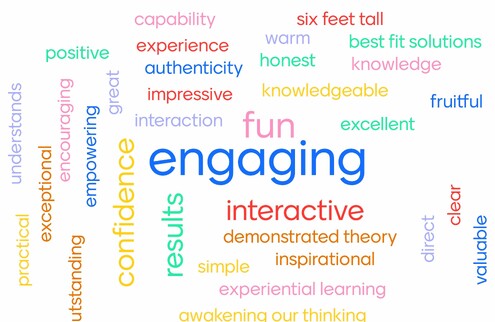Group Facilitation skills
It takes confidence and skill to facilitate groups. Meetings are supposed to be interactive; they are a time when a group can collaborate and generate better solutions than on their own. In the hands of a skilled facilitator, a group meeting can make good quality decisions, come up with great solutions, and move forward the action on a project.
Hard to Have Conversations
Courageous, difficult and hard-to-have conversations are where there are differing opinions, perceptions, and needs/wants; feelings and emotions run strong, and the consequences or stakes are significant.
Whatever you call them we often will avoid or delay having them. And for some of us, we can't avoid them as we get to have them every day.
Trainers Toolkit
Gain confidence and become better equipped to deliver training whether it be online or face-to-face, to any size audience.
Coaching Conversations
Coaching can be a thought-provoking and creative process, recognising that each person has solutions within themselves - sometimes they just need help unlocking them. These conversations identify strengths and challenges and guide a person towards reaching their potential. They do not have to take a long time, sometimes it is as simple as adopting a growth mindset and asking a few questions, right through to a formal, structured conversation.
People Management Fundamentals
Reflect on what it will take to be the kind of manager you want to be. Dipping into your own experiences of “memorable managers”, you will explore how to shift your focus from where you are responsible only for your own work to being responsible for other people. And not just their performance and productivity but also their wellbeing.
Our workshops
Maygrove workshops are all about real-life application of skill and knowledge into current workplaces. We discuss well known models and theories, and help participants explore how to apply into your unique context.
All are designed around sound adult learning principles. Using the KNOW-DO-VALUE model for generating learning outcomes, we make sure there is always the right amount of information (KNOWledge), the right amount of skill (DO), and most importantly, look at the underlying beliefs and values it takes to be willing to use the new skills.
We use a learning methodology based on the 4-mat system (by Dr Bernice McCarthy) which enables us to help individuals explore the four fundamental questions that need answering in order for an individual to be able to not only know more but be able to carry out the actions required. Those questions are:
WHY should I learn this? WHY is it relevant to me?
WHAT information is there? WHAT are the facts? WHAT models are we looking at?
HOW does this work? HOW will it work in my context?
WHAT IF? Explore all the possible "what ifs" – the exceptions, alternatives, etc

